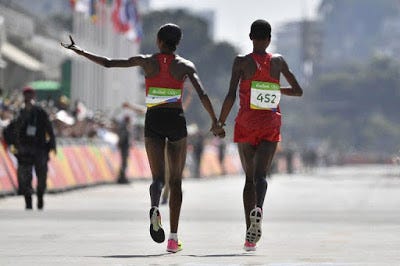The suicide-bomber tactics of East African dopers
Dealing with Kenyan dopers (including the mercenaries who are bought by Middle Eastern states) presents many of the same challenges as confronting suicide bombers: How do you stop someone who doesn't care about the worst consequences?

Jemima Sumgong (L) and Eunice Kirwa celebrate their juicy 1-2 finish after the 2016 Olympic Marathon in Rio de Janeiro. Both have since been suspended for doping; both are unlikely to be stripped of their medals. (Photo credit: Fabrice Coffrini/AFP)
While they and many others like them obviously prefer to not get caught, they're not really discouraged from worrying about it. A single major marathon win or high placing is enough to set up someone from a poor country like Kenya (average GDP in 2017: $1,169 in U.S. dollars) virtually for life. It's usually more than one race, though: The fairly obvious pattern is to dope like hell, ride the wave of a series of (often shockingly) great performances, and recede from view. It may take months or a few years for the inevitable drug positives to become known, by which time the caught runner has his or her money safely in hand.
In other words, it's literally worth it to a lot of the world's best runners to dope because they care a lot more about lining their pockets than avoiding shame. (Looks toward the U.S. Capitol) You see the same impulse in countless realms all around the globe, obviously.
All of this, of course, ignores the reality that a lot of athletes enjoy protected status, sometimes for their entire careers. This is not conspiratorial thinking, as anyone who has heard of a certain Texas cyclist and a well-known bike race in western Europe is aware. Anyone who thinks that shoe companies do not conspire with sports governing authorities to cover up doping by popular athletes who raise the profile of the sport is a fool.
So what's the answer? U.S.-only prize money at major American marathons would be going too far even if it ensured discouraging all cheaters and only cheaters. Targeting specific countries is a non-starter. There's probably not much do be done at root level because competitive human beings, at root level, like to cheat and cut corners and fuck each other out of resources, no matter who they are or what faith they claim to hold or what pursuit they choose. Not everyone, obviously, but a high fraction of the people driven to succeed.
I would never want my own kid to be a world-class runner, assuming such an unlikely organism were interested in running in the first place. I'd like to see her reach, say, the level of an NCAA All-American, but not be good enough to consider running professionally and be faced with the choice of other getting her ass repeatedly kicked by juiced-up Russians, Africans, Turks, and others or going on the magic sauce herself. Best to quit the sport and get a job doing something honorable.
Also, shitbags like Renato Canova are largely responsible for this. Anyone who listens to him or any of those fossilized Italian pricks who pretend to be "coaches" but are nothing more than fuel for the PED fire is sorely misguided. It sums up the sport perfectly that Letsrun, which has a full-throated anti-doping stance, has given this guy the title of "Coach" on his message-board login despite his years-long history of flagrantly, laughably inane comments about East Africans and doping. I'm betting the world will find out one day what a dirtball he is. And this has real consequences, because a lot of high-end runners and coaches like to follow Canova-style plans, which is highly questionable when you're not on an illicit blood-booster and sleeping all day when not training.
Finally, don't pretend the Ethiopians aren't in on this. They have always lagged a few years behind since the Kenyans came on the scene in big numbers in the early 1990s or so, and there are apparently some practical and political factors that makes catching them more difficult. Go ahead and believe that your heroes and heroines from that country are "cleaner" than the ones from Kenya while it lasts, because this illusion will be shattered before too long as well.
UPDATE -- 11:07 p.m. MDT, May 23: I'll blame this on traveling, but I left out the whole idea that gave me the idea for this post in the first place.
Doping positives should trigger the annulment of all previous WC, Olympic, and World Marathon Majors results by caught athletes, no matter how much time has passed. The IAAF won't do this because it would require too much admittedly messy work. But it's kinda their job.
No one really wants the reality of having to routinely reassign medals (not so much the actual pieces of metal, but the places) at unpredictable times, and extracting ill-gotten prize money would be a nightmare as well.
But it would accomplish a few important things.
At a minimum, confirmed cheaters would never be able to say, "I still am, and always will be, the 2008 Olympic Champion in XXX" or the like. And it shouldn't matter even if the caught athlete was in fact "clean" at such times (as if this could somehow be known anyway).
Runners should have to plan on maintaining whole drug-free careers or being remembered as, in effect, never having had a career as a pro athlete.
From a practical standpoint, yeah, this would be unwieldy. But I don't see a sound counter-argument from an ethical standpoint.

